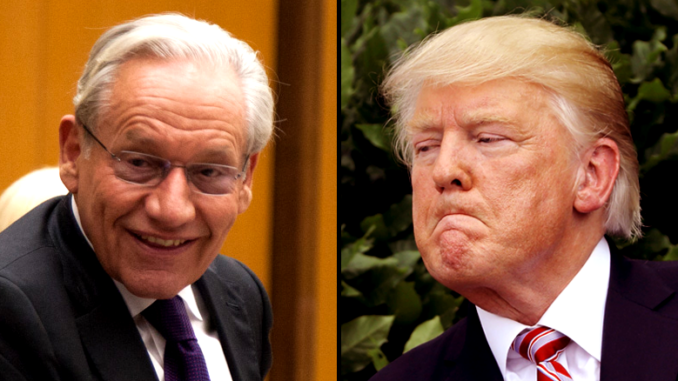
A week ahead of its official release, The Washington Post published some highlights from Bob Woodward’s forthcoming Fear: Trump in the White House (Simon & Schuster, 2018). The newspaper’s reporting drew a furious and continuing attack on the famed journalist from President Trump and the White House.
On September 4, the day the news broke, President Trump tweeted that the book contains “so many lies and phony sources.” Three days later, he was still railing against the book, tweeting, that the book is a “scam.”
The President’s angry reaction stems from the book’s stunning revelations of a White House in chaos and aides scrambling to avert disaster. The Washington Post reported:
A central theme of the book is the stealthy machinations used by those in Trump’s inner sanctum to try to control his impulses and prevent disasters, both for the president personally and for the nation he was elected to lead.
Woodward describes “an administrative coup d’etat” and a “nervous breakdown” of the executive branch, with senior aides conspiring to pluck official papers from the president’s desk so he couldn’t see or sign them.
Again and again, Woodward recounts at length how Trump’s national security team was shaken by his lack of curiosity and knowledge about world affairs and his contempt for the mainstream perspectives of military and intelligence leaders.
That account was corroborated in an op-ed submitted to The New York Times by a senior Trump Administration official and published anonymously. The author of that op-ed wrote:
The dilemma — which he [President Trump] does not fully grasp — is that many of the senior officials in his own administration are working diligently from within to frustrate parts of his agenda and his worst inclinations…
[W]e believe our first duty is to this country, and the president continues to act in a manner that is detrimental to the health of our republic.
That is why many Trump appointees have vowed to do what we can to preserve our democratic institutions while thwarting Mr. Trump’s more misguided impulses until he is out of office.
Whose account is closer to the truth? That of President Trump who has made an astounding 4,229 false or misleading claims during his first 558 days in office (The Washington Post), or two-time Pulitzer Prize-winning journalist Bob Woodward (Encyclopaedia Britannica)?
Woodward’s robust methodology and meticulous attention to detail suggests that his account is far more likely the largely accurate one. Woodward conducts background research related to the people he seeks to interview and for the context of situations he wishes to explore; conducts extensive interviews with large numbers of current and former Administration officials; repeatedly interviews important sources (frequently within hours or days of the events he explores when memories are freshest); tapes interviews whenever permission is granted; compiles documents, memos, diaries, and notes; limits direct quotes to those where sources have provided exact wording; corroborates his sources accounts against one another; and, uses the whole body of gathered evidence to piece together meetings, decisions, and events.
Woodward described his methodology in his The Commanders (Simon & Schuster, 1991), an account of the 1989 U.S. military operation in Panama and 1991 Persian Gulf War. Woodward explained:
Nearly all of the information comes from interviews with people directly involved in the decisions. More than 400 people were interviewed over the course of 27 months. The key sources were administration and Pentagon officials, both civilian and military… Many key participants were interviewed repeatedly, some on a regular basis as events unfolded. Several were interviewed two to three dozen times. I interviewed one important source 40 times, sometimes in a rushed four-minute phone call during a crisis, at other times in freewheeling one-hour conversations. Several important sources allowed me to tape our conversations, so their stories and recollections could be retold more fully than if I had been relying on my notes alone. A number of sources provided access to documents, memos, contemporaneous handwritten notes, schedules and chronologies.
Direct quotations from meetings or conversations come from at least one participant who specifically recalled or took notes on what was said. Quotation marks are not used when the sources were unsure about the exact wording…
Often I spoke to participants within hours or days of events in which they played a role… I have generally found that accounts given soon after an event are the most reliable…
Many of the sources for this book have decades of experience participating in important policy discussions and are trained to recall the details. Nonetheless, the sources’ accounts were carefully checked and rechecked against each other.
To assure a free flow of information, Woodward conducted his interviews under what’s known as “deep background” rules. Under “deep background,” sources provide information to the interviewer with the understanding that their names, offices, and titles won’t be revealed.
The Woodward book will be released next Tuesday. Almost certainly, President Trump and his press team will intensify their efforts to discredit both the book and its author. However, the combination of Woodward’s methodology, the early corroboration of a key theme by an anonymous senior Trump Administration official, and the President’s own lack of credibility strongly suggest that the book’s account will provide both a realistic and reasonable account of the Trump Administration’s first year-and-a-half in office.
